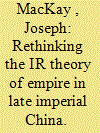|
|
|
Sort Order |
|
|
|
Items / Page
|
|
|
|
|
|
|
| Srl | Item |
| 1 |
ID:
140027


|
|
|
|
|
| Summary/Abstract |
This paper seeks to explore and explain the process through which Taiwan utilizes free trade – both at multilateral and bilateral levels – in enhancing its shrinking de facto sovereignty against the backdrop of ubiquitous ‘China factor’ in the twenty-first century. It argues that China's sinicization project creates a scenario wherein increasing cross-strait stability ironically leads to decreasing de facto sovereignty for Taiwan. Due to this existing cross-strait security dilemma, Taiwanese leaders are being forced to preserve the island's quasi-independent statehood due to fears of losing its remaining de facto autonomy over domestic and foreign affairs. In essence, Taiwan chooses to be de facto free by remaining de jure unfree. Taiwan's sovereign space, therefore, becomes a pivotal referent object of its national security policy and strategy. Balancing between the two paradoxical interests of enhancing sovereignty while maintaining the Chinese-dominated cross-strait status-quo underlines the relentless games, changes, and fears that Taiwan confronts today.
|
|
|
|
|
|
|
|
|
|
|
|
|
|
|
|
| 2 |
ID:
140025


|
|
|
|
|
| Summary/Abstract |
American extended deterrence commitments span the globe. Despite extensive research on the causes of deterrence successes and failures, evidence of which US allies find what extended deterrence commitments credible is elusive. This article utilizes interviews with former Australian policy-makers to analyze the credibility of the United States to defend Australian forces during the 1999 INTERFET intervention in East Timor. While there was no direct threat to Australian sovereignty, the episode stoked concerns in Canberra regarding the willingness of Washington to come to Australia's assistance. The Howard government coveted a US tripwire force presence, and the Clinton administration's unwillingness to provide this raised serious concerns among Australian political elites about the alliance. While this says little about the separate question of whether Washington would use nuclear or conventional weapons in defense of Australian sovereignty, the Timor case indicates the existence of an extended deterrence credibility deficit regarding the more probable low-intensity conflicts that Australia finds itself in.
|
|
|
|
|
|
|
|
|
|
|
|
|
|
|
|
| 3 |
ID:
140028


|
|
|
|
|
| Summary/Abstract |
The global issue of humanitarian intervention has become more pronounced and complicated in recent years due to increasingly diverging views on addressing security crises between the West on one side and Russia and China on the other. Despite their support for the principles of ‘Responsibility to Protect’ (R2P), both Russia and China are wary of Western intervention in internal conflicts after the Cold War and have become increasingly critical of Western-led armed intervention in humanitarian conflicts. Unease in Beijing and Moscow over the multilateral intervention in the 2011 Libyan conflict and their ongoing opposition to Western policies in the Syrian Civil War since 2011 would seem to point to ever more coincidence in their negative views of American and Western intervention policies. A conventional wisdom has thus emerged that there is something akin to a Sino–Russian ‘bloc’, with near-identical policies of discouraging armed intervention within state borders under the aegis of humanitarian intervention or the R2P doctrine, signed in 2005 (2005 World Summit). However, closer examination of Russian and Chinese positions on the Libyan and Syrian conflicts, drawing on normative and identity perspectives, reveals significant differences in how both states address intervention in civil conflicts involving human rights emergencies. Indeed, the Libyan and Syrian cases suggest that the distance between the two states on ‘acceptable’ policies toward international intervention in civil conflicts may actually be increasing. While Russia has assumed the role of the ‘loud dissenter’ in global dialogs on humanitarian intervention, China has opted for the position of a ‘cautious partner’.
|
|
|
|
|
|
|
|
|
|
|
|
|
|
|
|
| 4 |
ID:
140029


|
|
|
|
|
| Summary/Abstract |
The future of nuclear energy use has become increasingly contentious across the world. This is especially the case in Taiwan, which simultaneously suffers from the instabilities associated with fossil fuel imports and widespread public doubts about the government's ability to handle a Fukushima-scale disaster, while also being increasingly dependent on nuclear energy. This study employs the 2013 Taiwan Election and Democratization Study (TEDS) survey on the Lungmen Nuclear Power Plant to gauge public opinion on the nuclear issue. The results demonstrate that while the public tends to be pro-nuclear when they are informed about the financial consequences of abandoning nuclear power and reassured about safety concerns, opponents of nuclear power, though numerically fewer, tend to be more vocal. Further research is needed to determine the exact logic of the public's decision making, based on a more precise set of preconditions.
|
|
|
|
|
|
|
|
|
|
|
|
|
|
|
|
| 5 |
ID:
140026


|
|
|
|
|
| Summary/Abstract |
International relations scholars have recently taken increased interest in empire. However, research has often focused on European colonial empires. This article aims to evaluate imperialism in a non-Western historical setting: Late Imperial China. The article first compares extant international relations (IR) accounts of empire (one broad and one narrow) to theories of the East Asian hierarchical international system. Second, to further specify analysis, I evaluate IR theories of empire against the historical record of the Ming and Qing dynasties, addressing Chinese relations with surrounding ‘tributary’ states, conquered imperial possessions, and other neighboring polities. I argue that while IR theories of empire capture much of the region's historical politics, they nonetheless underspecify it. Theories of East Asian hierarchy suggest additional mechanisms at work. The historical cases suggest extensive variation in how empires expand and consolidate. I conclude that there is room for further theory building about empire in IR and suggest possible areas of emphasis.
|
|
|
|
|
|
|
|
|
|
|
|
|
|
|
|
| 6 |
ID:
140024


|
|
|
|
|
| Summary/Abstract |
A growing sense among academics and policymakers alike is that the dominant issues of the twenty-first century will be decided in Asia-Pacific. But, the open question is how will these issues be decided: Who defines the rules of the game in the region and how? To address these questions, this paper studies the regulatory competition that is unfolding in the region. In particular, it examines the Trans-Pacific Partnership (TPP), with its potential to redraw the political-economic geography in Asia. Why is such a significantly path-breaking institution possible? This paper builds on the scholarship of international political economy and especially the literature on international institutions. It argues that this potential of the TPP crucially depends on the institutional environment in East Asia. A state of institutional anarchy enables the TPP to take hold in Asia. Important policy implications follow regarding the strategic use of international institutions.
|
|
|
|
|
|
|
|
|
|
|
|
|
|
|
|
|
|
|
|
|